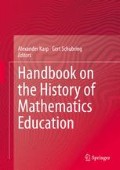Abstract
Given that Germany was constituted of a multitude of sovereign states and became a federal state only in the twentieth century, this chapter studies the differences in the nineteenth century between the various states regarding mathematics teaching. The contrast between neo-humanism in Prussia and states maintaining dominance of the classical type of education is exposed as well as a certain harmonization from 1871 onwards. A particular focus of international impact is the reform movement from about 1900. The political history marks the following developments: Germany became a Republic in 1918, but mathematics and science teaching were affected by the trauma of World War I. Nazi Fascism overthrowing the Republic in 1933 put mathematics in its service. World War II led to the emergence of two German states, again with a different status for mathematics.
Access this chapter
Tax calculation will be finalised at checkout
Purchases are for personal use only
Notes
- 1.
For the emergence of the school type devoted to the realist disciplines of Realschulen, see the chapter on Western Europe.
- 2.
The complete text of the Süvern-Plan is published in Schweim (1966).
- 3.
This applies in particular to Prussia; other states maintained the seminary structure.
- 4.
See the analysis of German mathematics schoolbooks for the Weimar and Nazi periods in Ullmann (2008).
- 5.
Mathematik im Dienste nationalpolitischer Erziehung mit Anwendungsbeispielen aus Volkswissenschaft, Geländekunde und Naturwissenschaften.
- 6.
See “Nürnberger Lehrpläne,” Der mathematische und naturwissenschaftliche Unterricht, 17 (1965/1966), 433–439.
- 7.
Zur Verbesserung und weiteren Entwicklung des Mathematikunterrichts an den allgemeinbildenden polytechnischen Oberschulen der DDR“; published among others in: Mathematik und Physik in der Schule, 2 (1962), 141–150.
- 8.
It should be emphasized that these curricular reforms occurred without direct influence by the Kolmogorov reform in the Soviet Union.
References
Athen, Hermann. 1966. Die Modernisierungstendenzen im Nürnberger Rahmenplan fü̈r Mathematik. Der Mathematikunterricht 12(3): 87–106.
Birnbaum, Peter. 2003. Schulsystem und Mathematikunterricht in der DDR. In Didaktik der Mathematik in den alten Bundesländern – Methodik des Mathematikunterrichts in der DDR. Bericht über eine Doppeltagung zur gemeinsamen Aufarbeitung einer getrennten Geschichte, ed. H. Henning and P. Bender, 13–25. Magdeburg: Universität Magdeburg, Fakultät für Mathematik.
Borneleit, Peter. 2003. Lehrplanerarbeitung und Schulbuchentwicklung in der DDR. In Didaktik der Mathematik in den alten Bundesländern – Methodik des Mathematikunterrichts in der DDR. Bericht über eine Doppeltagung zur gemeinsamen Aufarbeitung einer getrennten Geschichte, ed. H. Henning and P. Bender, 26–49. Magdeburg: Universität Magdeburg, Fakultät für Mathematik.
Erziehung und Unterricht in der Höheren Schule. 1938. Ed. Reichs- und Preußisches Ministerium für Wissenschaft, Erziehung und Volksbildung. Berlin: Weidmann.
Gispert, Hélène, and Gert Schubring. 2011. Societal, structural and conceptual changes in mathematics teaching: Reform processes in France and Germany over the twentieth century and the international dynamics. Science in Context 24(1): 73–106.
Keitel, Christine. 1980. Entwicklungen im Mathematikunterricht. Bildung in der Bundesrepublik Deutschland. In Band 1: Entwicklungen seit 1950. Max-Planck-Institut für Bildungsforschung, ed. Projektgruppe Bildungsbericht, 448–499. Stuttgart: Klett-Cotta.
Morel, Thomas. 2013. An institutional history of classical mathematics teaching in Saxony (1773–1848). International Journal for the History of Mathematics Education 8(1): 41–71.
Paulsen, Friedrich. 1909. Aus meinem Leben. Jugenderinnerungen. Jena: Diederichs.
Schubring, Gert. 1986. Bibliographie der Schulprogramme in Mathematik und Naturwissenschaften (wissenschaftliche Abhandlungen) 1800-1875. Bad Salzdetfurth: Franzbecker.
Schubring, Gert. 1989. Pure and applied mathematics in divergent institutional settings in Germany: The role and impact of Felix Klein. In The history of modern mathematics. Volume II: Institutions and applications, ed. David Rowe and John McCleary, 171-220. Boston: Academic.
Schubring, Gert. 1991. Die Entstehung des Mathematiklehrerberufs im 19. Jahrhundert. Studien und Materialien zum Prozeß der Professionalisierung in Preußen (1810-1870), Zweite, korrigierte und ergänzte Auflage. Weinheim: Deutscher Studien Verlag.
Schubring, Gert. 1992. Zur Modernisierung des Studiums der Mathematik in Berlin, 1820–1840. In AMPHORA. Festschrift für Hans Wußing zu seinem 65. Geburtstag, ed. S.S. Demidov et al., 649–675. Basel: Birkhäuser.
Schubring, Gert. 2007. Der Aufbruch zum ‘funktionalen Denken’: Geschichte des Mathematikunterrichts im Kaiserreich. N.T.M. 15: 1–17.
Schubring, Gert. 2010. Die Debatten um einen Mathematiklehrplan in Westfalen 1834. In Eine regionale Sozialgeschichte der Einführung von Mathematik als Hauptfach. Münster: WTM Verlag.
Schubring, Gert. 2012. Antagonisms between German states regarding the status of mathematics teaching during the 19th century: Processes of reconciling them. ZDM – The International Journal on Mathematics Education 44(4): 525–535.
Schweim, Lothar. 1966. Schulreform in Preußen. Entwürfe und Gutachten. Beltz: Weinheim.
Ullmann, Philipp. 2008. Mathematik – Moderne – Ideologie: eine kritische Studie zur Legitimität und Praxis der modernen Mathematik. Konstanz: U.K.Verlagsgesellschaft.
Wieleitner, Heinrich. 1913. Der mathematische Unterricht an den höheren Lehranstalten soie Ausbildung und Fortbildung der Lehrkräfte im Königreich Bayern. Lepzig/Berlin: Teubner.
Wiese, Ludwig. 1867. Gesetze und Verordnungen für die höheren Schulen in Preußen. Erste Abtheilung: Die Schule. Berlin: Wiegandt und Grieben.
Wolff, W. 1911. Die Entwickelung des Unterrichtswesens in Hessen-Cassel vom 8. bis zum 19. Jahrhundert. Cassel: Selbstverlag.
Zymek, Bernd. 1989. “Schulen [Schools]”, Handbuch der deutschen Bildungsgeschichte, Band V: 1918–1945. In Die Weimarer Republik und die nationalsozialistische Diktatur, ed. Dieter Langewiesche and Heinz-Elmar Tenorth, 155–208. München: Beck.
Author information
Authors and Affiliations
Corresponding author
Editor information
Editors and Affiliations
Rights and permissions
Copyright information
© 2014 Springer Science+Business Media New York
About this chapter
Cite this chapter
Schubring, G. (2014). Mathematics Education in Germany (Modern Times). In: Karp, A., Schubring, G. (eds) Handbook on the History of Mathematics Education. Springer, New York, NY. https://doi.org/10.1007/978-1-4614-9155-2_12
Download citation
DOI: https://doi.org/10.1007/978-1-4614-9155-2_12
Published:
Publisher Name: Springer, New York, NY
Print ISBN: 978-1-4614-9154-5
Online ISBN: 978-1-4614-9155-2
eBook Packages: Mathematics and StatisticsMathematics and Statistics (R0)

